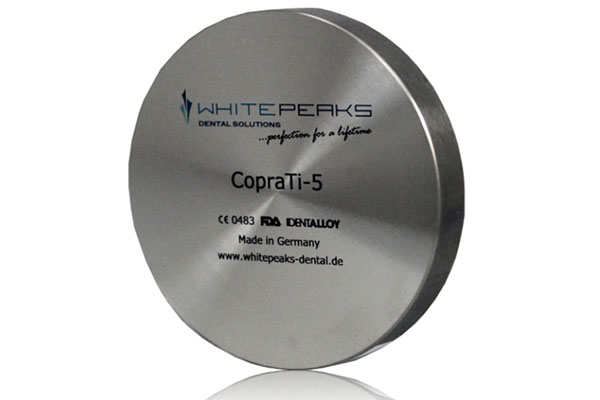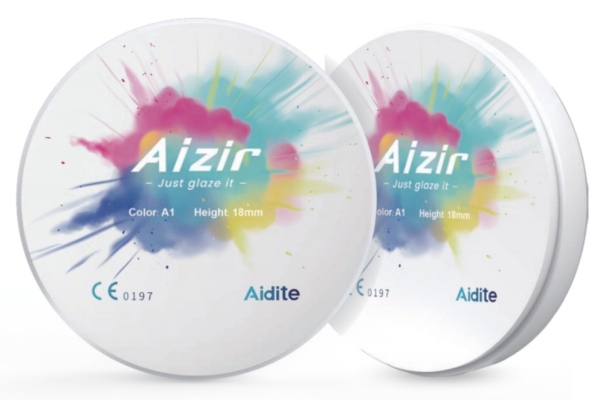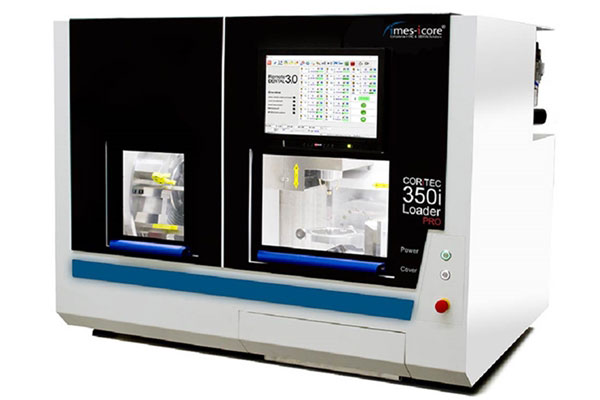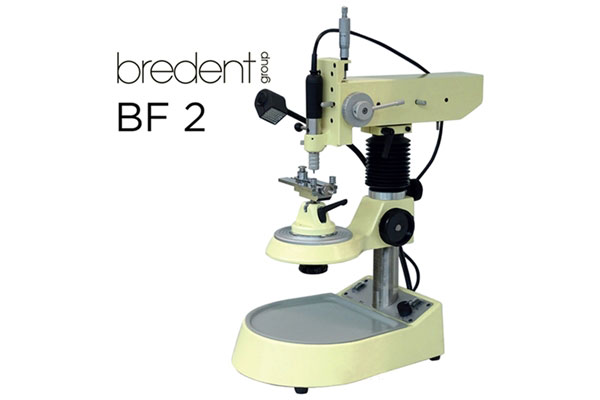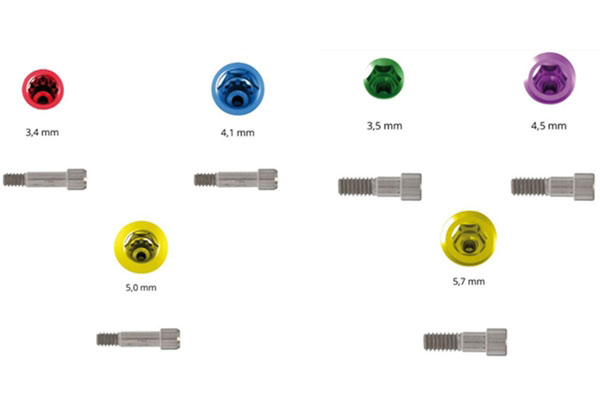Dental Implants Lab From China
Robust Implants Dental Cases
Affordable Dental Implants
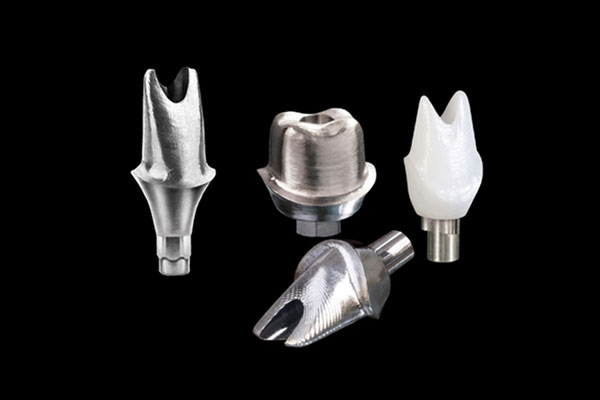
Personalized Abutments
A personalized dental abutments is often milled out of pure titanium blocks. It is a light-weight but very strong customized component used in dental implant cases. It is designed to fit uniquely for each patient’s mouth, ensuring better aesthetics and functionality compared to stock abutments (standard abutments). The personalized abutment is created based on a patient’s specific dental structure and needs, offering a more tailored solution for dental implant cases.
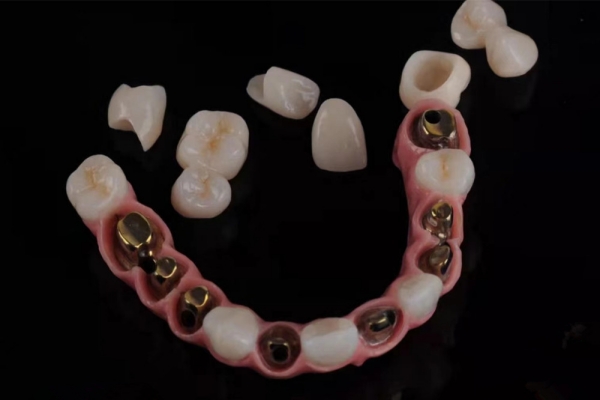
All on 4 Dental Implants
All on 4, All on 6 dental implants or Malo bridge, is a mature dental restoration technique used for full-mouth reconstruction. It involves placing dental implants in either four or six positions in the jawbone to support a pure titanium substructure. Then individual crowns are mounted onto the substructure as a fixed bridge, replacing a full arch of missing teeth. This technique offers a stable and functional solution for people who have lost most or all of their teeth in one or both jaws.
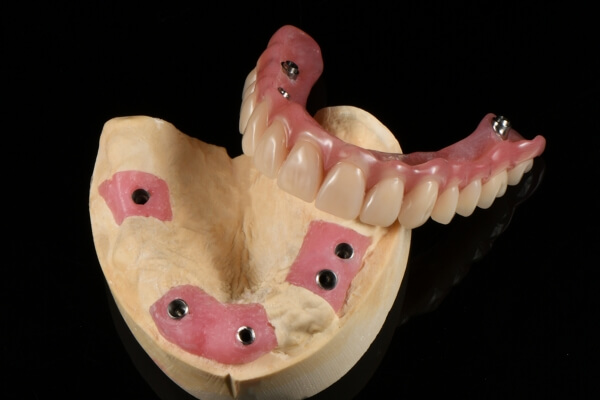
Implant Supported Dentures
An implant supported denture (or implant bar over-denture) combines dental implants with a removable denture. It involves attaching a pure titanium bar to dental implants embedded in the jawbone. The implant bar over denture can be screwed into implants as a fixed restoration. Or the denture can clip/snap onto this bar as a removable restoration. Both ways provide increased stability and retention compared to traditional removable dentures. This solution offers better support, comfort, and functionality for patients who may struggle with conventional dentures.
Teeth Implants: Lab Equipment & Material
Robust Dental Implants Specification
| Product: | Dental Implants |
| Common Implant systems: | Dentium, Zimmer, MIS, Nobel, Osstem, Astra, Straumann, etc. |
| Optional crowns and bridges | Zirconia, E.max. Composite, PFM |
| Material for custom abutments: | Whitepeaks (Titanium Block), Aidite from China (FDA/ CE certified) |
| Way of manufacturing: | CAD/ CAM/ Traditional Way |
| Design software: | 3Shape |
| Our scanning device: | 3Shape |
| CAD/CAM milling machine: | imes-icore 350i |
| Warranty: | 5 years |
Dental Implants FAQ Guide
1. What is a dental implant?
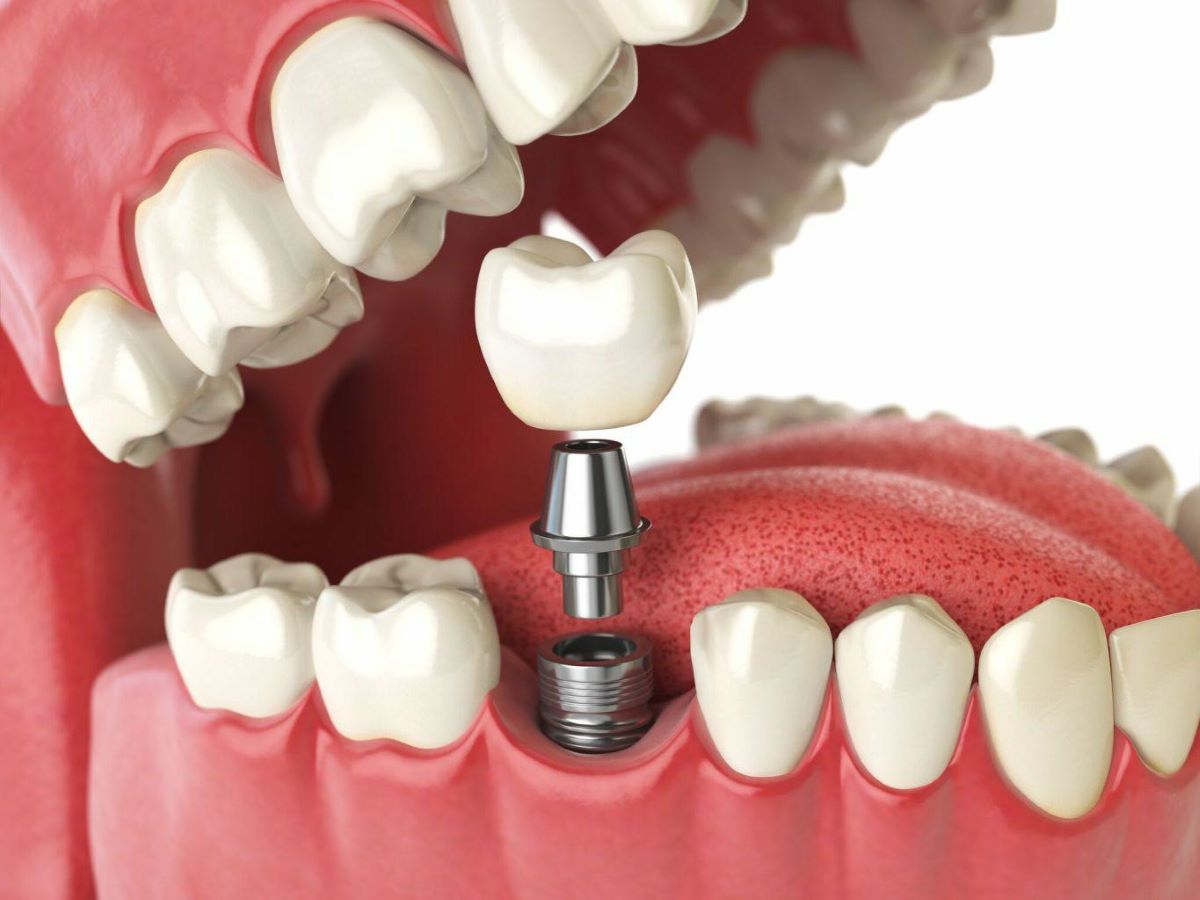
Implant restoration can be considered when a patient has a missing tooth. To comprehend what a dental implant is, it helps to think about it in its three distinctive parts: dental implant, abutment and crown.
A dental implant is a titanium post surgically placed into the jawbone beneath the gum line. It acts as a replacement tooth root, providing a strong foundation for fixed or removable replacement teeth. Once the implant integrates with the jawbone, it will connect to an abutment (it can be either a personalized abutment or a stock abutment). This abutment serves as an anchor for crowns, bridges, or dentures, mimicking the function and appearance of natural teeth. Dental implants are a durable and long-term solution for replacing missing teeth. Please note the crowns can be made of metal, porcelain fused to metal, or all-ceramic.
2. Types of dental abutments
There are usually 2 types of dental abutments in dentistry: stock (standard) abutments and personalized (custom) abutments.
Personalized abutment
A personalized abutment (or a custom abutment) is often milled out of pure titanium blocks or zirconia blocks. It is specially designed and helps fit uniquely for each patient’s mouth, ensuring better aesthetics and functionality. Now more and more dentists choose personalized abutments, because they offer remarkable advantages:
- Personalized angle: Correct the deviation of implant positions
- Personalized gingival height: Getting a proper bonding interface and implant health
- Personalized gingival shape: Preservation and support of the shape of soft tissues, making aesthetic effects possible
Stock/ standard abutment
A stock abutment (or a standard abutment) is a premade, standardized component used in dental implant procedures. Stock abutments come in various sizes and shapes but are not customized to fit a specific patient’s mouth. They are typically used when the standard dimensions of the abutment match the patient’s needs without requiring customization. Normally, dentists ship stock or standard abutments to Robust dental lab. Robust dental technicians trim the abutments to a proper size, so they can help mount dental crowns. They are more cost-effective than personalized abutments. However, they require good positions of the implants that are placed in the patients’ mouths.
Multi-unit abutment
When an implant is having a very difficult position, a multi-unit abutment (usually personalized) can be a great solution. It is a more complex dental abutment customized to fit specific patient needs, often used in implant dentistry to support prosthetic teeth. It’s designed to accommodate various angles, heights, or positions for dental implants, providing a tailored solution for each patient’s unique situation.
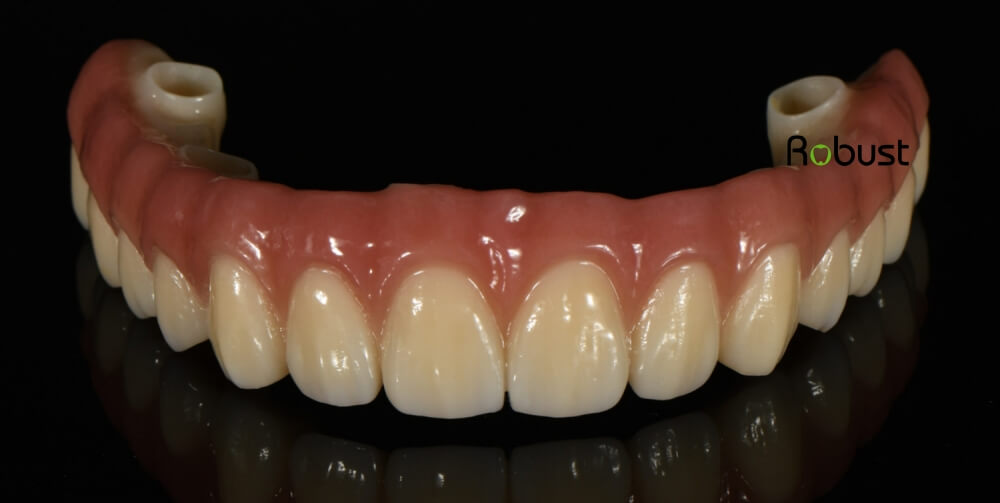
3. Types of dental implant crowns
There are several types of dental implants: screw-retained implant cases, cement-retained implant cases.
Screw-Retained Implant Crown
A screw-retained implant crown is mostly chosen by dentists. Instead of cementing the crown onto the implant abutment, it’s attached using a screw that secures it directly onto the abutment. This method allows for easier access in case maintenance or adjustments are needed without damaging the restoration. Screw-retained crowns provide a strong and retrievable connection between the implant and the crown for long-term stability. Dentists often ask for a screw-retained implant crown.
Cement Retained Implant Crown
Unlike the screw-retained crown, a cement-retained implant crown is fixed onto the implant abutment using dental cement. The crown is cemented onto the abutment, providing a secure and esthetic finish. While it doesn’t offer the retrievability of a screw-retained crown, it can provide a more seamless appearance since there’s no screw access hole visible on the crown.
In many cases (usually for front teeth), dentists have to choose a cement-retained implant crown. For example, if an implant is placed buccally, the dentist has to use a cement-retained crown. If a screw-retained implant is used in this case, then the screw hole will expose to the buccal side. It would look very unnatural.
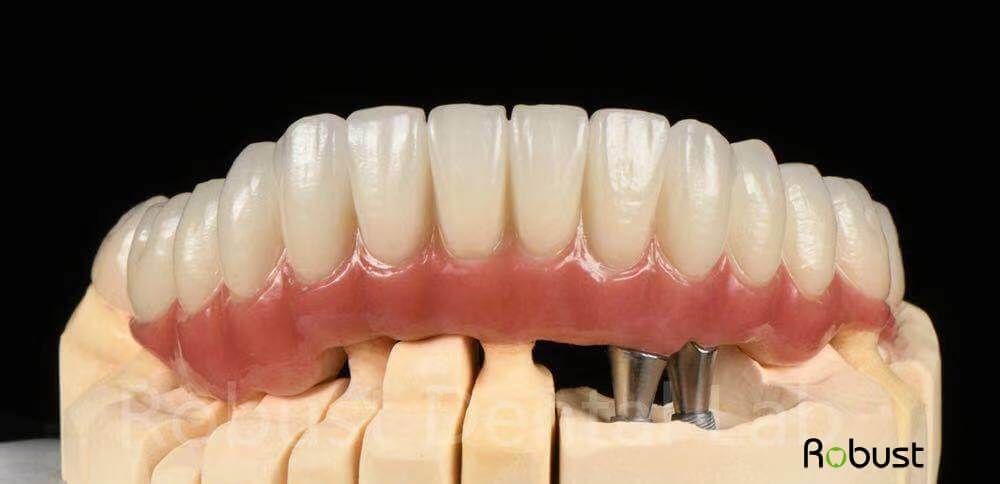
4. What types of dental implant cases does Robust dental supply?
With the advance of technologies, more and more implant types are coming out. Robust dental lab keeps pace with the latest trends, and helps process the following dental implant cases:
- Implant bar over zirconia bridge
- Malo bridge (All-on-4/ All-on-6 implant bridge)
- Implant bar over denture
- Personalized pure titanium abutment
- Personalized zirconia abutment
- Personalized multi-unit abutment
5. Is a dental implant painful?
Similar to any type of surgical procedure, you ought to anticipate some quantity of pain immediately adhering to the dental implant positioning. This ranges from mild to modest most of the time, and also numerous individuals easily control their pain with nonprescription painkillers such as acetaminophen or Advil. If needed, you can ask your dental professionals to prescribe stronger pain medicine.
6. How long does it take a dental implant to heal?
After the dental implant is positioned, a healing period of 5-6 months is required to allow the bone to recover around the implant. During this period, you will have to wear a temporary dental crown. Once healed, the dental implant is ready for a dental crown.
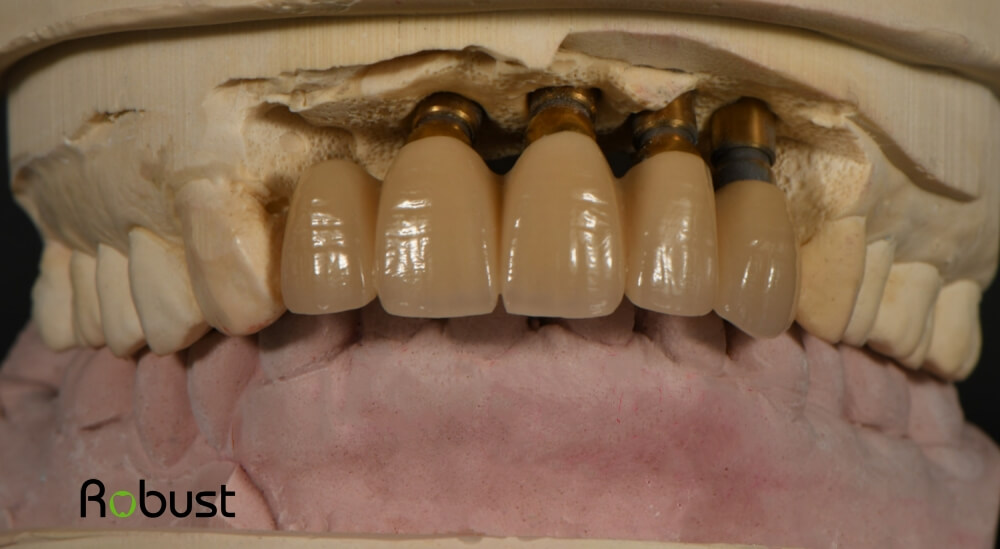
7. Will I have to remain to see the dentist after I have dental implants positioned?
Your dental upkeep timetable should not be changed, once you have the dental implant.
8. How long will dental implants last?
For durability, it’s important to think of the dental implant as 2 separate parts. The remediation, whether a crown or even denture, can crack. In these instances, new remediation can be made and also positioned on the existing dental implant body. If there is a problem with the dental implant body itself, such as a dental implant infection, dental implant fracture, or dental implant denial, the dental implant surgical treatment process should be done again. At Robust Dental our 15-year success price is 95% for both dental implants and remediations.
9. Am I too old for dental implants?
You should consult your dentists if you are an aged person.
10. Why pick dental implants over dentures?
The bones of your jaw require excitement to preserve their shapes and size. The bone of your jaw gets this from sticking to the roots of your all-natural tooth. When a tooth or multiple teeth are shed, the bone cells of the jaw start to liquify or reabsorb around that area. With time this can change the shape of the jaw and the fit of the dentures. A dental implant duplicates the roots of your teeth and also maintains face structure.
11. Can I eat conveniently with implants?
Your final remediation will mimic your all-natural teeth and also many clients report no problem with eating.
12. What occurs if I postpone dental implant surgery?
People shed teeth for a selection of factors including injury and also damage because of tooth decay. Once the tooth is eliminated from your jaw, the bone under it is no longer boosted and also starts to reabsorb. If too much bone has been reabsorbed, positioning the dental implant will need more product (normally a bone graft) to appropriately put and also seat the dental implant.
13. How much do dental implants expense?
This will certainly rely on the sort of products used for both the dental implant itself and also the last restoration. Your dentists will certainly review the choices as well as regular prices throughout your complimentary examination.
14. Why are dental implants expensive?
Dental implants can seem like a pricey venture yet are normally extra affordable in the long term as a result of their long life. Other tooth replacement choices such as a bridge or dentures will usually need upkeep or substitute multiple times and ultimately these options bring about bone loss.
15. Will my insurance cover my dental implants?
We will certainly enjoy submitting to your insurance company: due to the fact that we do not get involved with insurances, any insurance policy repayments will be sent directly to you.
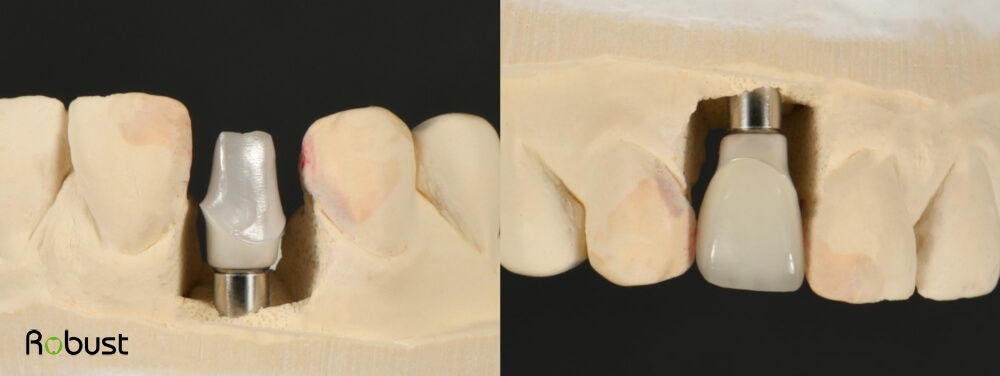
16. Can dental implants be removed?
Yes, it is possible to remove the dental implant from the patient’s mouth, even if it is considered a permanent tooth replacement option. Listed below are three reasons why implants may need to be removed.
Change position
Sometimes, when the implant is not in the right place, it is necessary for the dental professional to remove it. It is very important that each tooth is aligned correctly because it can bite correctly. This type of surgery is also called repair implant surgery because it corrects the position of the misplaced implant.
Early implantation failure
Early implant failure means that the implant is not properly attached to the jawbone. If a patient’s body rejects the implant because of infection, or if it rejects the implant because of host rejection, this may happen. When a patient experiences implant failure early, it often occurs in the first two to three months after implantation. Before the implant is removed, it is difficult for dental professionals to know whether the early failure is due to infection or if the implant is not fully integrated with the jaw.
Late implantation failure
Late implant failure means that even if the implant has been placed in the patient’s mouth for more than a year, it still fails. Like early implant failure, late implant failure may also be due to oral infection or the implant is not fully attached to the jawbone. The second additional reason is that too much force is applied to the implant, causing it to become very loose and may need to be completely removed from the mouth.
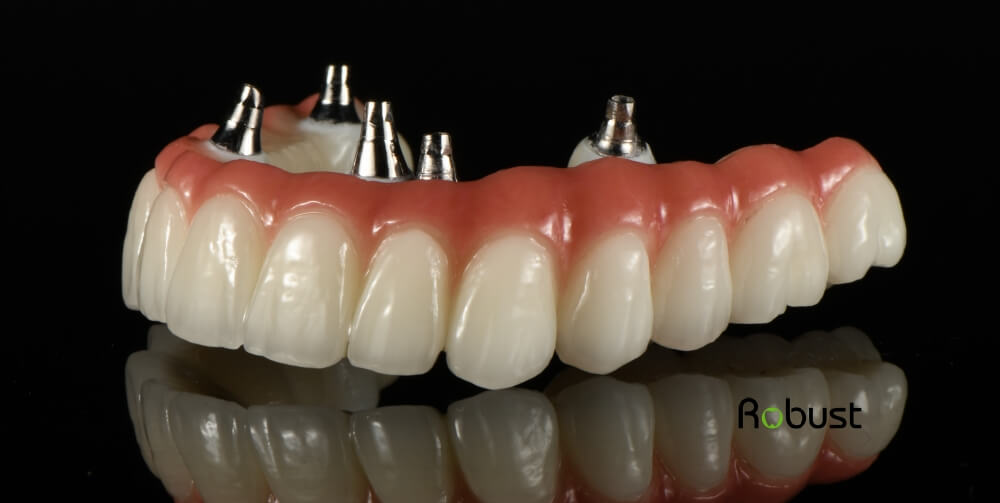
17. Is a dental implant right for you?
In order to know if dental implants are the right choice, please understand that contacting us now to arrange an appointment will let you know all the procedures. The initial consultation is a good opportunity for you to have any questions about implants because our dental professionals have many years of implant placement experience. Robust is a professional dental implants lab in China with over 10 years dental lab outsourcing experience, if you have any question, please feel free to contact us.
